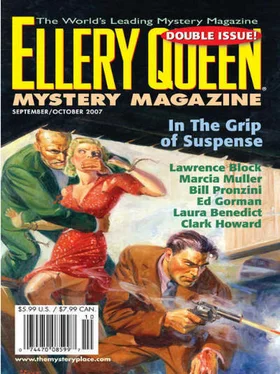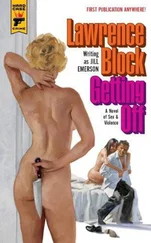Lawrence Block - A Chance to Get Even
Здесь есть возможность читать онлайн «Lawrence Block - A Chance to Get Even» весь текст электронной книги совершенно бесплатно (целиком полную версию без сокращений). В некоторых случаях можно слушать аудио, скачать через торрент в формате fb2 и присутствует краткое содержание. Год выпуска: 2007, Издательство: Dell Magazines, Жанр: Современная проза, на английском языке. Описание произведения, (предисловие) а так же отзывы посетителей доступны на портале библиотеки ЛибКат.
- Название:A Chance to Get Even
- Автор:
- Издательство:Dell Magazines
- Жанр:
- Год:2007
- ISBN:нет данных
- Рейтинг книги:3 / 5. Голосов: 1
-
Избранное:Добавить в избранное
- Отзывы:
-
Ваша оценка:
- 60
- 1
- 2
- 3
- 4
- 5
A Chance to Get Even: краткое содержание, описание и аннотация
Предлагаем к чтению аннотацию, описание, краткое содержание или предисловие (зависит от того, что написал сам автор книги «A Chance to Get Even»). Если вы не нашли необходимую информацию о книге — напишите в комментариях, мы постараемся отыскать её.
And that's probably just as well.
A Chance to Get Even — читать онлайн бесплатно полную книгу (весь текст) целиком
Ниже представлен текст книги, разбитый по страницам. Система сохранения места последней прочитанной страницы, позволяет с удобством читать онлайн бесплатно книгу «A Chance to Get Even», без необходимости каждый раз заново искать на чём Вы остановились. Поставьте закладку, и сможете в любой момент перейти на страницу, на которой закончили чтение.
Интервал:
Закладка:
Lawrence Block
A Chance To Get Even
A little after midnight, Gordon Benning, a balding gastroenterologist with a perpetually dyspeptic expression on his long face, announced as he dealt the cards that his next deal would be his final hand. Several players indicated their agreement, and one, a CPA with a propensity for stating the obvious, said, “So this is the last round.”
And so it was. Richard Krale (Dick to his friends, Richard to his wife, who reserved the diminutive for a specific portion of her husband) would have preferred it otherwise. He wished the game could go on for another three hours, so that he might recoup his losses, or that it had ended three hours earlier, when he’d been briefly ahead. Now he had, what? Six, seven hands to get even?
The game was dealer’s choice, and ninety percent of the time the choice was seven-card stud. The dealer anted a buck for the table, the limit was five dollars, ten dollars on the last card. (The same betting rules applied in five-card stud. In draw poker, the bet was five dollars before the draw, ten dollars after.)
Krale was the host, as well as being the evening’s big loser. In the latter capacity more than the former, he suggested doubling the betting limits for the final round. That was all right with Mark Taggert, who had a mountain of chips in front of him, but the other players shook their heads dismissively, and that was that. It was by no means unusual for someone, generally the biggest loser, to make this suggestion; it was always voted down.
And that was just as well for Krale, as it turned out, because his luck was no better in the last round than it had been for the preceding three hours. It was worse, if anything, because desperation led him to play hands he’d have been well advised to fold at their onset, and to stay to the end in hands where he should have cut his losses. When Benning dealt the last hand of the evening, Krale chased flush and straight possibilities, backed into two pair, queens over fives, tried to buy the pot with a raise, and lost to Taggert’s three sixes.
“Hey, the night’s a pup,” he said. “No reason to quit now.”
No one even bothered to respond. They were all counting their chips and figuring out what they had coming, and in turn they announced their totals and waited for Krale to pay them. He’d set aside the cash they’d all bought in with, and when that was gone he still had two players to pay off — Norm McLeod, who had $120 coming, and Taggert, who’d had a very good last round.
He dug out his wallet, counted out five twenties and a pair of tens, and paid McLeod, who looked almost apologetic as he pocketed the money. Taggert, who looked not at all apologetic, announced that the chips in front of him came to $538.
“Stick around,” Krale said. “I’ll have to write you a check.”
The others left, and Krale shook their hands and wished them well. Then he took his time finding his checkbook.
“Some run of cards,” he said.
“You caught a lot of second-best hands,” Taggert said. “Nothing much you can do when that happens but wait for the cards to turn.”
“They never did.”
“There’s always next week.”
“I hate to wait that long,” Krale said. He’d uncapped the pen but had not as yet touched it to the check. “You in a rush to get home?”
“You want to play some more?”
“I wouldn’t mind.”
“Heads up, you mean? Just the two of us?”
Krale made a show of looking to his left and right, then at Taggert. “I don’t see anybody else here,” he said, “so I guess we’re stuck with each other.”
Taggert thought about it. “I’ll just keep these chips, then.”
“Right. And I’ll help myself from the bank.” He did so, stacking the chips in front of him, giving himself a bigger bankroll than Taggert’s. That would help psychologically, he told himself. The player with fewer chips was at a disadvantage, doomed to play with a loser’s mentality. This way he could feel like a winner, and it was only a matter of time before he’d be one.
Taggert didn’t seem awed by Krale’s chips. He rearranged his own stacks, and for some reason the new arrangement made it look to Krale as though there were more of them.
“Same rules?”
Krale nodded. “Except we can forget about the three-raise limit,” he said. “Since there’s just the two of us.”
“Makes sense.”
“How about a drink before we get started?”
“Good idea,” Taggert said.
Krale went to the bar and poured a brandy for each of them. They sat with their drinks, and he suggested they cut for deal, and then his wife walked into the room. She said, “Hi, hon. I hope it went—” and stopped in midsentence when she realized her husband had company.
“Hello, Tina.”
“Mark,” she said. “I’m sorry, I wouldn’t have come in if I’d known you were still here.”
“What’s the matter, don’t you love me anymore?”
She grinned. “I know better than to interrupt you boys. Poker’s a serious matter.”
“Oh, it’s not all that serious,” Taggert said. “We just pretend it’s serious so that we can keep up our interest in it. Like war or business.”
“I see.”
“Mark’s the big winner,” Krale said, “and he’s giving me a chance to win some of my money back.”
“You’ll probably win it all back,” Taggert said, “and then some.”
“Not unless the cards turn.”
“They always do, sooner or later.”
“Well,” Tina Krale said. “Is it all right if I wish you both good luck?”
When she left the room, Taggert’s eyes lingered on her retreating form. This did not go unnoticed by Krale.
They cut cards to determine who’d deal the first hand, and Krale was high.
“Look at that,” Taggert said. “The cards are turning already.”
But his tone was ironic, and it was clear to Krale that he didn’t believe it. Taggert expected to go on winning for as long as Krale sat across the table from him. As though it wasn’t a matter of luck, or cards, or the breaks of the game. As though it was all predetermined by the character of the players, and winners won while losers lost, and he was a winner as sure as Krale was a loser.
A loser with a big house and a going business and money in the bank. A loser with a beautiful wife.
But a loser all the same.
The big house was mortgaged to the rafters. The money in the bank came to less than the outstanding bills. The going business...well, it was going, all right. Going broke, going to hell in a handbasket, going, barring a miracle, out of business. Going, going, gone.
And the beautiful wife?
Krale took a deep breath and dealt the cards.
Half a dozen rounds in, Taggert dealt and Krale looked at a deuce and six to go with the ten he had showing. Different suits, of course. “Check,” he said, and Taggert shook his head.
“Oh, right,” Krale said. They’d changed the rules to avoid hands that got checked to excess, and whoever was high had to make a first-round bet. “Bet,” he said, unnecessarily, and tossed a chip into the pot.
His next card paired the six. This time he was entitled to check, and did, but Taggert bet, and the pair of sixes kept him in the hand. He kept having enough to call, and the ten he caught on the river gave him two pair, and he knew his tens up were beat but called the last bet anyway, because he had so much in the pot already, and Taggert had kings up and won the hand.
He gathered up the cards, shuffled them. “Maybe we should raise the stakes,” he suggested.
“Sure,” Taggert said. “What do you say we make the raise retroactive?”
“Very funny.”
“I’ve got a better idea, Dick. Why don’t we call it a night?”
Читать дальшеИнтервал:
Закладка:
Похожие книги на «A Chance to Get Even»
Представляем Вашему вниманию похожие книги на «A Chance to Get Even» списком для выбора. Мы отобрали схожую по названию и смыслу литературу в надежде предоставить читателям больше вариантов отыскать новые, интересные, ещё непрочитанные произведения.
Обсуждение, отзывы о книге «A Chance to Get Even» и просто собственные мнения читателей. Оставьте ваши комментарии, напишите, что Вы думаете о произведении, его смысле или главных героях. Укажите что конкретно понравилось, а что нет, и почему Вы так считаете.












